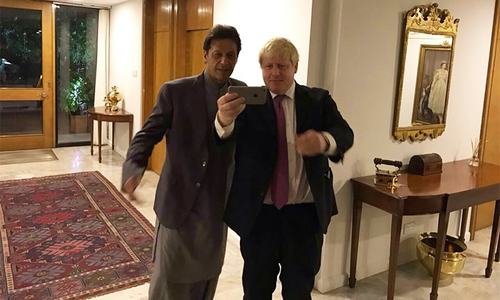UK's Johnson to visit India next month in first major trip as PM

Prime Minister Boris Johnson will travel to India next month in his first major bilateral visit to another country since taking power last year, his office said on Tuesday, as Britain eyes post-Brexit trade deals.
During the trip, Johnson will invite India to join next year's G7 summit, which Britain is hosting, as one of three guest countries, alongside South Korea and Australia.
The Indian trip is aimed at strengthening bilateral trade ties and investment, and cooperation in various areas including defence, security, health and climate change.
It will coincide with India's annual Republic Day celebrations on January 26. It will also come just weeks after the UK leaves the European Union single market on December 31 and as it seeks new trade deals post-Brexit.
“I am absolutely delighted to be visiting India next year at the start of an exciting year for Global Britain, and look forward to delivering the quantum leap in our bilateral relationship that Prime Minister [Narendra] Modi and I have pledged to achieve,” Johnson said in a statement.
“As a key player in the Indo-Pacific region, India is an increasingly indispensable partner for the United Kingdom as we work to boost jobs and growth, confront shared threats to our security and protect our planet.”
Johnson's visit follows an invitation from Modi, who last weekend took part in a climate summit hosted by London, and its announcement comes with British Foreign Secretary Dominic Raab in India this week.
“What we recognise [are] the possibilities for a deeper trading relationship, the contours of our economy I think would allow that,” Raab told a joint New Delhi news conference with his Indian counterpart S. Jaishankar.
“We will want to nudge our trade ministers along and see what we can achieve.”
Jaishankar said there was “a very serious intent” to intensify the two countries' trade relationship. “We see the strategic case,” he told reporters.
'Growth opportunities'
Britain left the EU on January 31 and is in a standstill transition period where the bloc's rules still apply until December 31, as it tries to secure a free-trade agreement.
But it has in recent months struck deals with a number of countries, including Japan and Singapore, as part of its post-Brexit “Global Britain” strategy.
As part of the plan, Britain announced on Tuesday it had signed a trade deal with Mexico, with plans for a more substantial agreement next year.
“This deal supports a trading relationship worth more than £5 billion and locks in access to each other's markets, ” said UK trade minister Liz Truss.
“This is also the seventh trade deal we've secured with a member of CPTPP, the grouping of 11 dynamic economies around the Pacific. So, it's another really important stepping stone toward the UK joining CPTPP,” she added.
In India, Raab said Britain had been “too myopically focused just on Europe” in the past, but could now look further afield.
“And certainly if you look at India and the Indo-Pacific region and take a long-term view, that is where the growth opportunities will be.”
Johnson will be only the second British leader since India's independence from Britain to attend the annual Republic Day parade in New Delhi as guest of honour, after John Major in 1993.
His office highlighted the two countries' burgeoning trade and investment relationship, which it said is worth £24 billion ($32 billion, 26 billion euros) annually and supports more than half a million jobs.
It noted their increased cooperation during the coronavirus pandemic, with India's large pharmaceutical sector supplying more than half of the world's vaccines.
At least a billion doses of Britain's Oxford/AstraZeneca vaccine are being manufactured at the Serum Institute in the western Indian city of Pune.
Meanwhile the UK has received 11 million face masks and 3m packets of paracetamol from India during the pandemic, according to Downing Street.













































